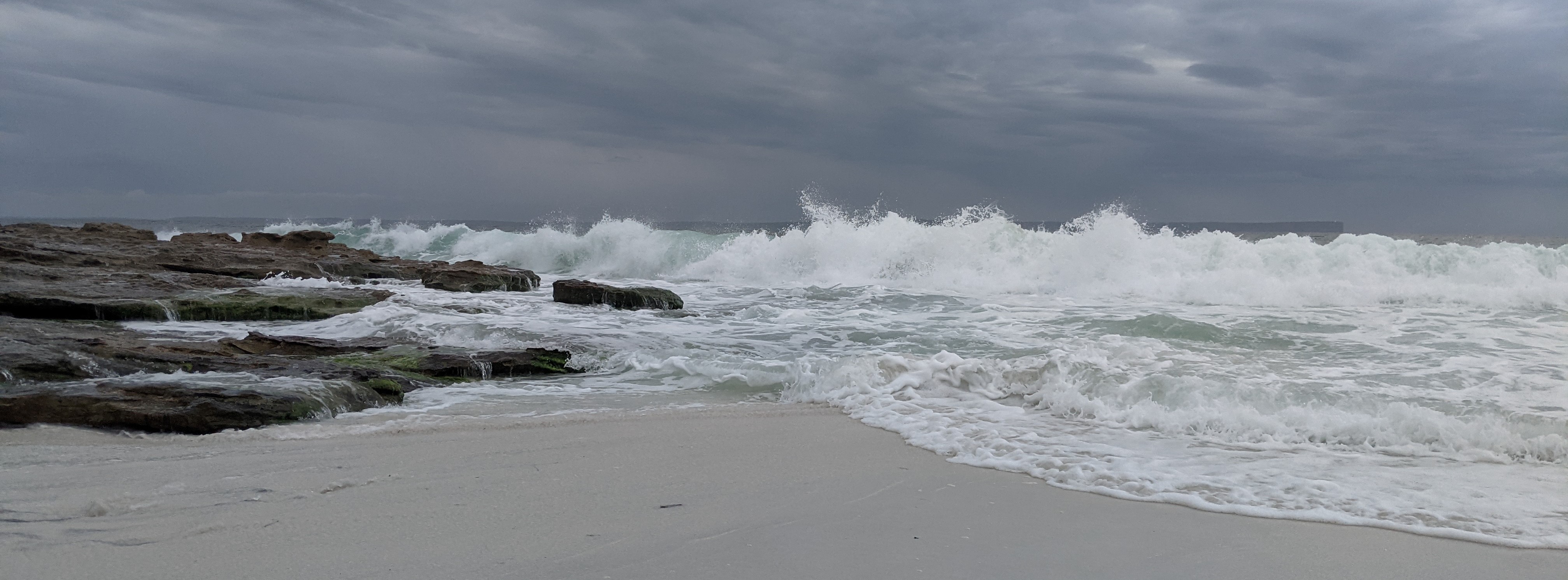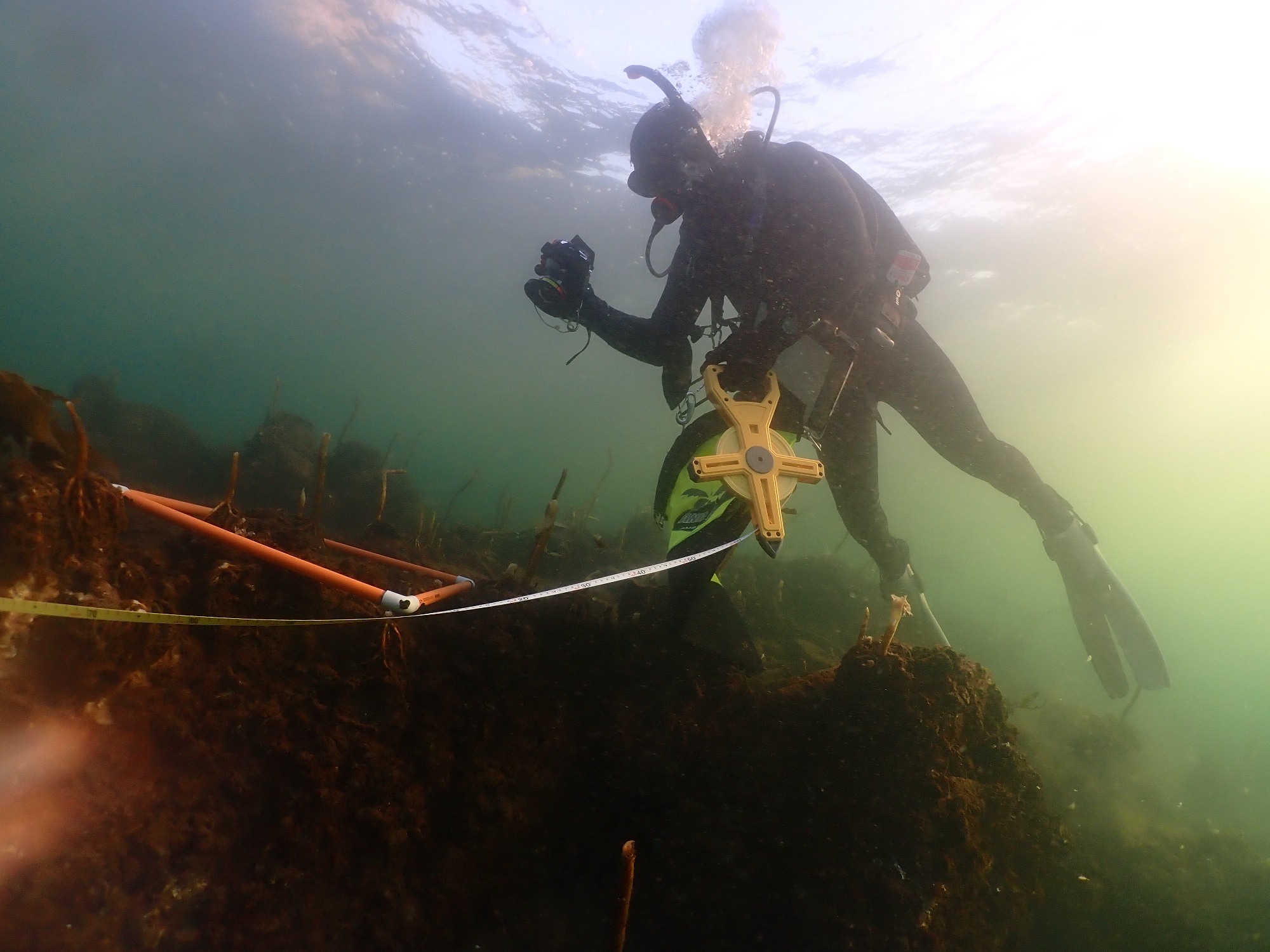
Climate change
The climate change research theme generates knowledge of the extant and predicted impacts of climate change on the NSW marine environment to support adaptation planning, strategies and decision-making. This is achieved through monitoring, experiments and modelling techniques applied to fill crucial knowledge gaps about climate change effects.
Please contact climate change research team leader, Adj. Prof. Melinda Coleman (melinda.coleman@dpi.nsw.gov.au) for more information.
Research focus
In the climate change research area we look at:
- Predicting future climate-driven changes to species distributions and their adaptive capacity
- Enabling future-proof marine management and restoration that anticipates climate change
- Understanding extreme weather events – emergency responses and impacts on marine ecosystems
- Increasing resilience to help mitigate the impacts of climate change
- The role of blue carbon in climate change and the blue economy
- Increasing the capacity of coastal and marine managers and communities to anticipate and adapt to climatic impacts

Current projects
Preparing for marine heatwaves
Marine heatwaves are increasing in intensity and frequency globally and generally have negative consequences for marine life. Preparing for and responding to these extreme events requires robust monitoring so we can detect impacts, assess the effectiveness of responses and track recovery. Our team are monitoring key marine habitats and species throughout the state as well as researching ways to boost resilience. This is a core component of the DPI Marine Heatwave Response Plan 23/24 (PDF, 1102.8 KB). Contact: Melinda Coleman.
Climate change research and monitoring
Research and monitor the effects of climate change on the marine estate to fill knowledge gaps and inform future management actions, focusing on marine biodiversity and coastal communities. Further project details can be found on the Change Climate Research and Climate change citizen science project pages on the NSW Marine Estate website. Melinda Coleman, Tom Davis, Curtis Champion
Climate change vulnerability assessment
Application of a consistent vulnerability assessment methodology to a suite of commercially and recreationally important marine fishes harvested throughout NSW. Future projections of species distributions created by this project will provide an understanding of locations throughout NSW where fishing opportunity for focal species is likely to increase or decline under near-future climate change. More details about this project can be found on the NSW DPI Climate Change and Industry Fisheries website. Curtis Champion
Future-proofing marine restoration and management
DPI scientists are using cutting edge genomics to enable assisted adaptation and restoration and identify climate refugia. Melinda Coleman, Green Gravel Action Group
Vulnerability and adaptation pathways for intertidal wetlands under sea level rise
As sea levels rise, mangroves and saltmarshes will be lost unless they are able to increase elevation in situ or migrate further up the shore. This collaboration with DPIE-EES identifies the estuaries with the greatest areas of wetlands at threat from sea level rise and the current barriers to upshore migration of these habitats. Tim Glasby, Greg West
Key publications
Davis TR, Larkin MF, Forbes A, Veenhof RJ, Scott A, Coleman MA (2022). Extreme flooding and reduced salinity causes mass mortality of nearshore kelp forests. Estuarine, Coastal and Shelf Science.
Layton C, Perez Matus A, Gonzalez A, Coleman MA (2022). Future-proofing kelp forest restoration for climate change. In Kelp Restoration Guidebook: Lessons Learned from Kelp Projects Around the World. Eger AM, Layton C, McHugh TA, Gleason M, and Eddy N, pp 5-9. The Nature Conservancy, Sacramento, CA, USA.
Veenhof RJ, Dworjanyn SA, Champion C, Coleman MA (2022). Grazing and recovery of kelp gametophytes under ocean warming. Frontiers in Marine Science.
Darbyshire R, Johnson SB, Anward MR, Ataollahid F, Burch D, Champion C, Coleman MA, Lawson J, McDonald SE, Miller M, Moj J, Timms M, Sun D, Wang B, Pardoe J (2022) Climate change and Australia’s primary industries: factors hampering an effective and coordinated response. International Journal of Biometeorology. https://doi.org/10.1007/s00484-022-02265-7
Shalders T, Champion C, Coleman MA, Benkendorff K (2022). Effects of climate change on seafood nutritional and sensory properties. Marine Environmental Research 176:105590. https://doi.org/10.1016/j.marenvres.2022.105590
Champion C, Hobday AJ, Zhang X, Coleman MA (2022) Climate change alters the temporal persistence of coastal-pelagic fishes off eastern Australia. ICES Journal of Marine Science.
Coleman MA, Reddy M, Nimbs MJ, Marshell A, Al-Ghassani S.A, Bolton JJ, Jupp BP, De Clerck O, Leliaert F, Madeira P, Serrao E, Pearson G, Champion C, Wernberg T (2022). Loss of a globally unique kelp forest and genetic diversity from Oman. Scientific Reports. Accepted 5/3/22
Veenhof RJ, Champion C, Dworjanyn SA, Wernberg T, Minne AJP, Reed, D, Layton C, Bolton JJ, Coleman MA (2022). Ecology of kelp gametophytes: implications in changing oceans. Oceanography and Marine Biology Annual Review, 60
Filbee-Dexter K, Wernberg T, Barreiro R, Coleman MA, de Bettignies T, Franco J, Hasler B, Louro I, Norderhaug KM, Staehr P, Tuya F, Verbeek J (2022) Leveraging the blue economy to transform marine forest restoration. Journal of Phycology. https://doi.org/10.1111/jpy.13239
Hughes, M.G., Glasby, T.M., Hanslow, D., West, G. & Wen, L. (2022) Random Forest Classification Method for Predicting Intertidal Wetland Migration Under Sea Level Rise. Frontiers in Marine Science. https://doi.org/10.3389/fenvs.2022.749950
Straub S.C., Wernberg T., Marzinelli E., Verges A., Kelaher B.P., Coleman M.A. (2021). Persistence of seaweed forests in the Anthropocene will depend on warming and marine heatwave profiles. Journal of Phycology. https://doi.org/10.1111/jpy.13222
Davis T.R., Champion C., Coleman M.A. (2021). Ecological interactions mediate projected loss of kelp biomass under climate change. (Accepted 23/11/21)
Veenhof R.J., Champion C., Dworjanyn S.A., Wernberg T., Minne A.J.P., Reed, D., Layton C., Bolton J.J., Coleman M.A. (in press). Ecology of kelp gametophytes: implications in changing oceans. Oceanography and Marine Biology Annual Review
Asuwaiyan N.A., Vranken S., Filbee-Dexter K., Cambridge M., Coleman M.A., Wernberg T. (2021). Genotypic variation in response to thermal events may facilitate adaptation under future climates. Marine Ecology progress Series. https://doi.org/10.3354/meps13802
Juterbock A., Minne A.J.P., Cock J.M., Coleman M.A., Wernberg T., Scheschonk L., Rautenberger R., Zhang J., Hu Z-M. (2021). Priming of macrophytes for enhanced restoration success and food security in future oceans. Frontiers in Marine Science. https://doi.org/10.3389/fmars.2021.658485
Davis T.R., Champion C., Coleman M.A. (2021). Climate refugia for kelp within an ocean warming hotspot revealed by stacked species distribution modelling. Marine Environmental Research. https://doi.org/10.1016/j.marenvres.2021.105267
Coleman M.A. & Wernberg T. (2021). A glass half full: solutions-oriented management under climate change. Trends in Ecology and Evolution. https://doi.org/10.1016/j.tree.2021.02.009
Champion C. & Coleman M.A. (2021). Topographic habitat associations slow predicted range shifts in warming oceans. Limnology and Oceanography. https://doi.org/10.1002/lol2.10185
Champion C., Brodie S. & Coleman M.A. (2021.) Climate driven range shifts are rapid yet variable among recreationally important coastal-pelagic fishes. Frontiers in Marine Science. https://doi.org/10.3389/fmars.2021.622299
Thomson A., Archer F., Coleman M.A., Gajardo G., Goodall-Copestake W., Hoban S., Laikre L., Miller A., O'Brien D., Pérez-Espona S., Segelbacher G., Serrao E., Sjøtun K., Stanley M. (2021). The missing piece: genetic diversity in the UN decade of ocean science. Evolutionary Applications. https://doi.org/10.1111/eva.13224
Vranken S., Wernberg T., Scheben A., Severn-Ellis A., Batley J., Bayer P.E., Edwards D., Wheeler D., Coleman M.A. (2021). Genotype-environment mismatch of kelp forests under climate change. Molecular Ecology. https://doi.org/10.1111/mec.15993
Wood G., Marzinelli E.M., Campbell A.H., Steinberg P.D., Verges A. and Coleman M.A. (2021). Genomic vulnerability of a dominant seaweed points to future-proofing pathways for Australia’s underwater forests. Global Change Biology. https://doi.org/10.1111/gcb.15534
Leung J.Y.S., Russell B.D., Coleman M.A., Kelaher B.P., Zhang S., Connell S.D. (2021). Long term thermal acclimation drives adaptive physiological adjustments to reduce sensitivity to climate change. Science of the Total Environment. https://doi.org/10.1016/j.scitotenv.2021.145208
Coleman M.A. & Wernberg T. (2020). The silver lining of extreme events. Trends in Ecology and Evolution. https://doi.org/10.1016/j.tree.2020.08.013
Clark J.S., Poore A.G.B., Coleman M.A., Doblin M.A. (2020). Thermal sensitivity to warming in low genetic diversity, warm-edge populations of a habitat-forming macroalga. Frontiers in Marine Science. https://doi.org/10.3389/fmars.2020.00711
Coleman M.A., Minne A.J.P., Vranken S., Wernberg T. (2020). Genetic tropicalisation of underwater forests. Scientific Reports. 10,12726. https://doi.org/10.1038/s41598-020-69665-w
Champion C., Broadhurst M., Ewere E., Benkendorff K., Butcherine P., Wolfe K., Coleman M.A. (2020). Resilience of a commercially important decapod to the interactive effects of climate change and discard stress. Marine Environmental Research. https://doi.org/10.1016/j.marenvres.2020.105009
Coleman MA, Wood G, Filbee-Dexter K, Minne AJP, Goold HD, Verges A, Marzinelli EM, Steinberg PD, Wernberg T (2020) Restore or redefine: future trajectories for restoration. Frontiers in Marine Science (Invited special issue). https://doi.org/10.3389/fmars.2020.00237
Davis T.R., Cadiou G., Champion C., Coleman M.A. (2020). Environmental drivers and indicators of change in habitat and fish assemblages within a climate change hotspot. Regional Marine Studies. https://doi.org/10.1016/j.rsma.2020.101295
Garcia-Echauri L.L., Liggins G., Cetina Hereida P., Roughan M., Coleman M.A., Jeffs A. (2020). Future ocean temperature impacts the survival prospects of post-larval spiny lobsters. Marine Environmental Research. https://doi.org/10.1016/j.marenvres.2020.104918
Gurgel C.F.D., Camacho O., Minne A.J.P., Wernberg T., Coleman M.A.. Marine heatwave drives cryptic loss of genetic diversity in underwater forests (2020). Current Biology 30: 1199-1206. https://doi.org/10.1016/j.cub.2020.01.051


